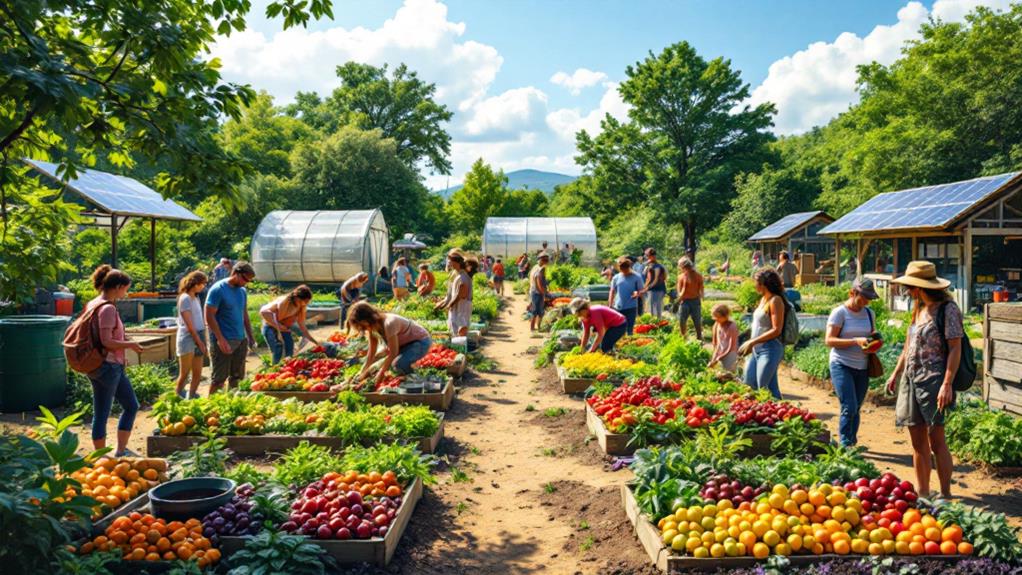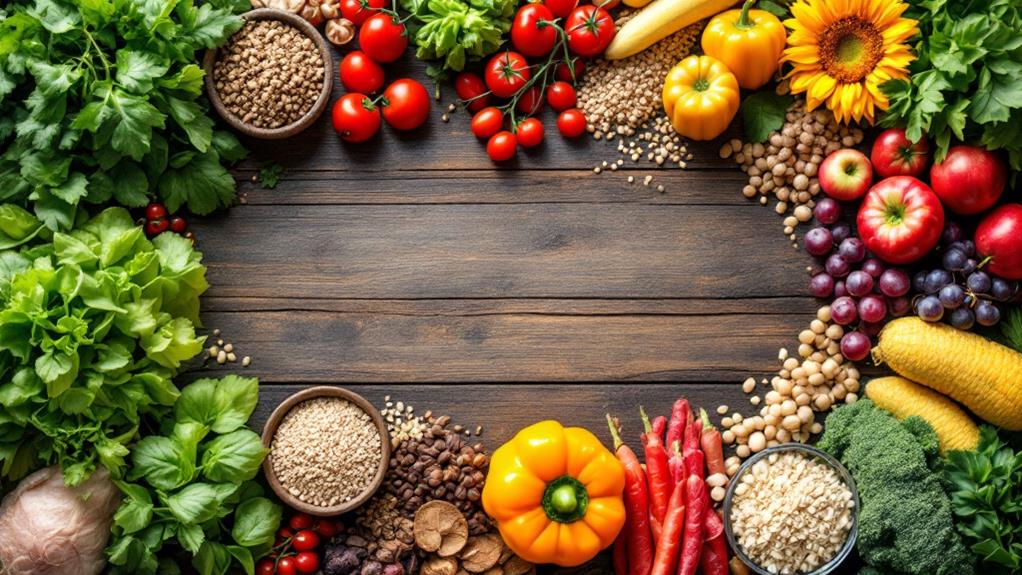World Food Day: How to Help in the Fight Against Hunger

On World Food Day, you can make a difference in the fight against hunger by supporting sustainable agriculture, which enhances food production while protecting the environment. Advocate for equitable food access to guarantee everyone has the basic right to nutrition. Get involved in local events and educational campaigns to raise awareness about food security issues. Volunteering at food banks or participating in community gardens also helps improve outreach to vulnerable communities. Share messages on social media using campaigns like #WorldFoodDay to amplify global awareness. There's a wealth of ways to contribute and each step plays a vital role in this global cause.
Understanding World Food Day
World Food Day rolls around every October 16, spotlighting the urgent issue of global hunger and food security in over 150 countries. It's a day established by the Food and Agriculture Organization in 1945 to advocate for your right to food. This annual event has evolved into a global movement, raising awareness and urging action on hunger and food security. You might not realize it, but your food choices can impact this global challenge. Opting for diverse nutritious food not only benefits your health but supports sustainable practices and helps address food insecurity.
The theme for 2024, "Right to Foods for a Better Life and a Better Future - Leave No One Behind," emphasizes the need for everyone to have access to diverse, nutritious, and affordable food. This theme highlights the connection between climate change and food security. As climate change affects agricultural productivity, you can assist by supporting initiatives and making informed food choices. Engaging in World Food Day activities like educational campaigns and community meals can make a difference. Through these actions, you're contributing to a broader effort led by the Food and Agriculture Organization to guarantee that hunger becomes a thing of the past.
Current Hunger Challenges
The stark reality of hunger persists, affecting millions across the globe. Hunger in the world is a complex issue worsened by numerous factors. Food insecurity affects approximately 690 million people, with the COVID-19 pandemic pushing this number to 733 million due to ongoing armed conflicts and economic downturns. Nearly 1 in 10 people go to bed hungry each night, facing severe hunger crises, especially in regions plagued by conflicts.
Climate shocks have doubled extreme climate-related disasters in the last 30 years, exacerbating food insecurity. These events threaten the right to adequate food by impacting smallholder farmers, who produce one-third of the world's food yet often can't access enough varied and nutritious foods themselves. Vulnerable populations, including women and smallholder farmers, face significant health issues due to undernourishment.
Economic barriers prevent over 2.8 billion people from affording a healthy diet, highlighting a vital challenge to achieving a better life for many. Addressing these issues requires understanding the current dynamics:
- Conflicts disrupt food production and distribution.
- Climate change intensifies food crises.
- Economic inequality limits food access.
- Vulnerable populations suffer disproportionately.
Understanding these challenges is essential for progressing toward a world without hunger.
Effective Hunger Solutions

Addressing hunger requires actionable solutions that tackle the root causes and mitigate ongoing challenges. You can play a part by supporting sustainable agriculture, which elevates food production while reducing environmental impact. Smallholder farmers, responsible for a third of the world's food, need resources to improve productivity. By advocating for climate-smart agriculture, you help strengthen food security, particularly in crisis situations where humanitarian aid is essential.
Improving food distribution systems is also important. It can greatly cut down on food waste, which shockingly accounts for about one-third of all food produced globally. Ensuring efficient distribution means more food reaches those in need, reducing food insecurity. You can promote healthy diets by championing local food systems. They foster community resilience and empower those who depend on aquatic food systems for their livelihoods.
Moreover, advocacy for policy changes is fundamental. By pushing for equitable food access, you can address the disparities affecting vulnerable populations, especially women, who face higher rates of food insecurity. As part of the global community, your efforts in these areas contribute to a more sustainable and hunger-free world.
Role of International Bodies
Numerous international bodies play a significant role in the fight against hunger by spearheading initiatives that improve global food security. The United Nations leads these efforts, focusing on boosting nutrition, guaranteeing food access, and supporting smallholder farmers. With approximately 690 million people facing hunger worldwide, international organizations collaborate with NGOs and local governments to tackle this crisis effectively. Safeguarding the right to food, the FAO works on legal frameworks and policy changes, particularly in areas affected by conflict and climate crises, to strengthen food security.
The World Food Programme (WFP) is instrumental in delivering humanitarian aid to families impacted by conflicts and natural disasters. They provide lifesaving supplies and promote food security through climate-smart agriculture techniques. Monitoring progress towards Sustainable Development Goal 2 (Zero Hunger) is fundamental for international organizations. It helps them assess and adapt their strategies in fighting global hunger.
- UN initiatives: Boost nutrition and food access.
- FAO's legal frameworks: Safeguard the right to food in crisis areas.
- WFP's humanitarian aid: Support through conflicts and disasters.
- Climate-smart agriculture: Strengthen food security for smallholder farmers.
Together, these efforts are significant in the global movement toward eradicating hunger.
Engaging Communities
In the fight against hunger, engaging communities can make a significant impact. By raising awareness through local events and educational campaigns, you help promote food security and shine a light on hunger issues. Social media campaigns, like those using #WorldFoodDay, reach people in over 150 countries, amplifying your message and encouraging global participation.
Community gardens and local sourcing initiatives are fantastic ways to enhance collaboration among residents. When you participate in these efforts, you're not just increasing access to healthy food but also strengthening local food systems. Promoting youth involvement through activities like poster contests and local food hero nominations can inspire them to adopt sustainable practices and tackle food waste.
Volunteering at food banks or charities is another powerful way to engage. By offering your time, you support vulnerable populations and help build community solidarity. Moreover, your voice matters in policy advocacy. By taking part in public discussions, you can influence legislative changes that promote food security and uphold the right to food for everyone.
Addressing Hunger in Crisis
Crises-induced hunger is a grim reality for millions worldwide, where conflict and climate shocks exacerbate food insecurity. Nearly 1 in 10 people face this harsh truth, with approximately 690 million going to bed hungry each night. The roots of this issue often lie in conflict-affected regions, where 85% of those experiencing hunger crises reside. Armed conflict disrupts agrifood systems, making it difficult for the rural poor to access their right to food. In these areas, climate change only worsens the situation, threatening the ability to produce safe and affordable food.
Addressing hunger in crisis situations requires extensive efforts, including:
- Humanitarian aid delivery: Providing lifesaving supplies to people facing hunger.
- Climate-smart agricultural practices: Supporting communities to adapt and thrive despite environmental challenges.
- Advocacy for civilian protection: Ensuring adherence to international humanitarian law to address causes of hunger.
- Improving food security: Empowering the rural poor to boost their resilience and access to food.
The COVID-19 pandemic has intensified these challenges, with over 730 million unable to afford a healthy diet. By focusing on these strategies, you can contribute to a world where hunger crises are effectively addressed, ensuring everyone's right to food.
Ending Hunger Together

While addressing hunger in crisis is challenging, tackling the issue requires a collective effort beyond immediate relief. You play a vital role in ensuring everyone enjoys the right to foods and lives free from hunger. During World Food Week, it is important to recognize that global hunger affects approximately 690 million people, and the pandemic has only worsened this crisis. By focusing on positive change, you can help drive efforts towards food security and sustainable agriculture.
Community engagement is a powerful tool. Local gardens and educational campaigns can raise awareness and empower communities to take charge of their food systems. By supporting such initiatives, you contribute to a foundation where sustainable agriculture thrives, ultimately reducing hunger.
Collaboration is key. International organizations, NGOs, and local governments need your support to implement effective programs. These partnerships can improve nutrition and food access, moving us closer to achieving Zero Hunger. Action Against Hunger, for example, reaches millions each year through prevention programs that rely on collective action.




